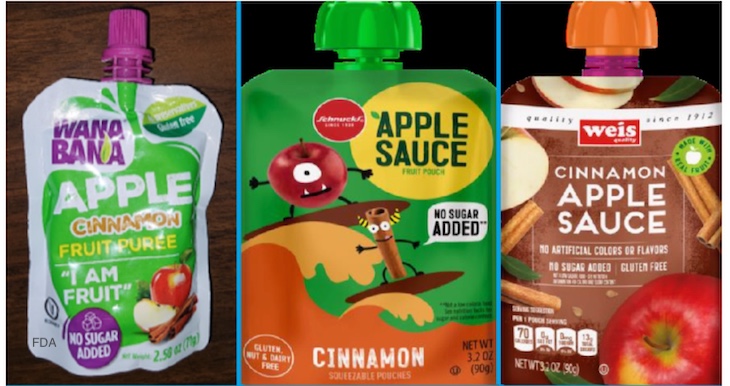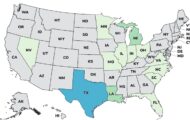Lead contaminated cinnamon in WanaBana apple cinnamon fruit puree pouches is the most likely cause of lead poisoning cases in children, according to the FDA. There are at least 57 children in 26 states who are likely sick with acute lead poisoning. That is an increase of five more cases since the last update that was issued on November 22, 2023.

The case count by state is: Alabama (1), Arkansas (1), California (1), Connecticut (1), Florida (1), Georgia (2) Iowa (1), Illinois (2), Kentucky (3), Louisiana (4), Massachusetts (3), Maryland (4), Michigan (3), Missouri (1), North Carolina (5), Nebraska (1), New Hampshire (1), New Mexico (1), New York (8), Ohio (2), Pennsylvania (1), South Carolina (2), Tennessee (1), Texas (3) Virginia (1), and Washington (3). The children are less than one year old to five years. Report dates range from October 17, 2023 to November 28, 2023.
On November 30, 2023, Austrofood, the distributor of WanaBana products in the United States, released a statement that a root cause investigation has been conducted. The firm’s leading hypothesis is that the cinnamon used in those products is the source of elevated lead levels.
That lead contaminated cinnamon was produced by Negocios Asociados Mayoristas S.A, operating as Negasmart, a third party distribution company that is located in Ecuador. The FDA is working with Ecuadorian authorities to investigate the source of the contamination. They also want to know if the cinnamon was used in other products or was distributed as a raw ingredient to other countries. Negasmart does not import cinnamon directly to the United States.
There is no safe level of lead consumption. This heavy metal can accumulate in the body and cause long term health effects such as lowered IQ, hearing loss, and learning disabilities, even with low exposure. Acute lead poisoning, which is caused by consuming higher doses in a short time period, has symptoms of irritability, weight loss, loss of appetite, fatigue, vomiting, and constipation. But some children will not show symptoms at all.
Since the FDA relies on self-reported information that is submitted by healthcare providers, consumers, and some state partners, there may be more children who are sick. Unlike foodborne illness outbreaks, which can be genetically linked to pathogens, there is no method to link lead exposure to a specific source. This can make establishing a causal relationship between a product and illnesses complicated.
The FDA has no indication that this issue extends beyond the recalled products, which include WanaBana apple cinnamon fruit puree pouches, Schnucks cinnamon applesauce pouches, and Weis cinnamon applesauce pouches. Please check to see if you have these products in your home. If you do, empty them directly into a trash can so others can’t harvest the product and use or resell them. Wash your hands thoroughly with soap and water after handling these items.
Experts recommend that if your child ate any of these products, you should talk to your pediatrician about getting them tested for blood lead levels.

If your child has been sickened with acute lead poisoning, please contact our experienced attorneys for help with a possible lawsuit at 1-888-377-8900 or text us at 612-261-0856. Our firm represents clients in lawsuits against grocery stores, restaurants, and food processors.




